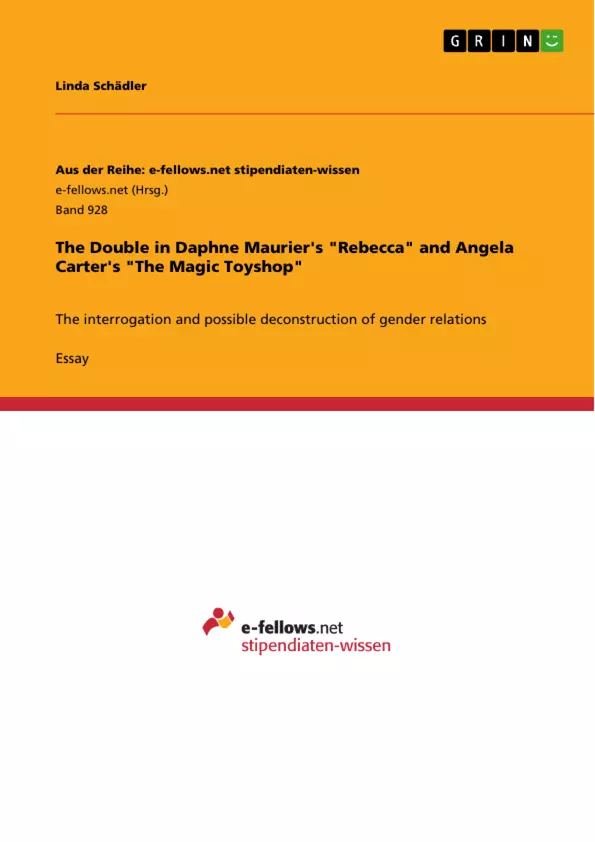Doubling is the “appearance of persons who have to be regarded as identical because they look alike” (Freud, 2003: 14) and, according to Freud, this can create an uncanny effect because “we are faced with the reality of something that we have until now considered imaginary” (Freud, 2003: 150). However, the trope of the double has far more potential than just sending shivers down our spines; its appearance might indeed raise, and confront us with, important questions concerning our own identity and subjectivity. I would like to exemplify this by comparing the importance of doppelgänger figures in Daphne du Maurier’s Rebecca and Angela Carter’s The Magic Toyshop in relation to gender identity and would like to investigate, in particular, how the trope of the double/phantom might call into question gender role expectations, shed light on their constructedness, and ultimately play an important role in overcoming social and sexual limitations.
Inhaltsverzeichnis (Table of Contents)
- The Trope of the Double
- Rebecca
- The First and Second Mrs de Winter
- Maxim and the “Threatening Woman”
- The Magic Toyshop
- The Puppet Master and the Puppet
- Melanie and the Mirror
Zielsetzung und Themenschwerpunkte (Objectives and Key Themes)
This work explores the use of the double as a literary trope in Daphne du Maurier's *Rebecca* and Angela Carter's *The Magic Toyshop*. It specifically examines how the trope of the double/phantom challenges gender role expectations, sheds light on their constructedness, and plays an important role in overcoming social and sexual limitations.
- The trope of the double and its connection to identity and subjectivity
- The construction of femininity and womanhood in relation to the double
- The role of the double in challenging societal expectations and limitations
- The exploration of gender identity and its instability, particularly in adolescence
- The impact of power dynamics and control on gender roles and identity
Zusammenfassung der Kapitel (Chapter Summaries)
The analysis begins with an exploration of the double in *Rebecca*, focusing on the relationship between the first and second Mrs. de Winter. The chapter examines how Rebecca's independent and unconventional behavior challenges traditional notions of femininity and serves as an unconscious model for the narrator, who struggles to define her own identity in her shadow. The chapter further discusses how Maxim's desire to control his wife and maintain a patriarchal order ultimately contributes to the narrator's self-doubt and sense of being a mere shadow.
The analysis then shifts to *The Magic Toyshop*, exploring the role of the double in the form of puppets and their influence on Melanie's emerging sense of identity. The chapter examines how Uncle Philip's control over the puppets and his desire for women to be silent and passive mirrors the patriarchal structures that restrict women's agency and expression. Melanie's struggle to define her own identity in the face of these oppressive forces highlights the fragility of identity and the importance of self-discovery in the face of societal pressures.
Schlüsselwörter (Keywords)
This analysis focuses on the themes of gender, identity, and the double, exploring how these concepts intersect in the works of Daphne du Maurier and Angela Carter. Key terms include: doppelgänger, phantom, femininity, masculinity, patriarchal structures, power dynamics, control, self-identity, subjectivity, and societal expectations.
Frequently Asked Questions
What is the "trope of the double" in literature?
It refers to the appearance of persons who look identical or act as doppelgängers, often creating an uncanny effect that challenges identity and subjectivity.
How is doubling used in Daphne du Maurier’s "Rebecca"?
The novel explores the relationship between the first Mrs. de Winter (Rebecca) and the second, where Rebecca acts as a phantom double overshadowing the narrator’s identity.
What role do puppets play in "The Magic Toyshop"?
In Angela Carter’s work, puppets serve as doubles that mirror patriarchal structures and the restriction of women's agency and expression.
How does the double challenge gender role expectations?
By highlighting the constructedness of femininity and masculinity, the double allows characters to confront and potentially overcome social and sexual limitations.
What is the "uncanny effect" according to Freud?
Freud describes the uncanny as the feeling when something we considered imaginary or hidden suddenly faces us as reality, often triggered by doppelgängers.
- Quote paper
- Bachelor of Arts Linda Schädler (Author), 2012, The Double in Daphne Maurier's "Rebecca" and Angela Carter's "The Magic Toyshop", Munich, GRIN Verlag, https://www.grin.com/document/274946



